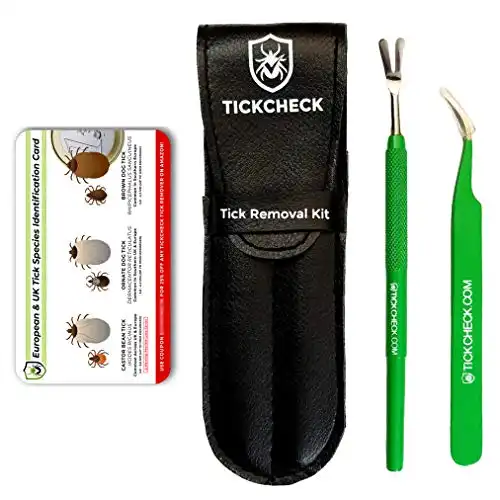I grew up at the beach and spending a day on the sand is one of my favorite joys in life. The national park near me has some of the most amazing hikes and beaches in the world.
That’s why I was surprised to learn that ticks (one of my least favorite things) can actually be found near the shore.
While you probably won’t find a tick while you’re digging in the sand, they can be found in beach dunes and grassy beach pathways where you make your way to the ocean.
Knowing this information, I was curious whether or not a dive in the ocean would be enough to take care of any pesky ticks who found their way onto me and eliminate any worries completely.
Can ticks survive in saltwater? Will saltwater kill a tick?
Saltwater can eventually dehydrate a tick and cause it to die, although it’s not 100% guaranteed. Ticks are capable of staying alive underwater for significant periods of time (several hours, possibly days), making saltwater an inefficient method for killing them.
A saltwater dive could possibly rinse off any unattached ticks that have crawled onto your skin, but it isn’t an effective method for dealing with attached ticks.
These nasty guys can carry harmful diseases and can be stubborn once latched on, so be sure to keep reading to learn how to properly remove and kill a tick.
Does Saltwater Affect Ticks?

Ticks are naturally sensitive to changes in their environment, and being submerged in saltwater can cause a tick to dehydrate and eventually die. Dehydration is how rubbing alcohol kills ticks and salt can have the same effect – in high enough concentrations.
Although this is true, ticks can be resilient little things. If you notice a tick bite while hanging out on the beach, a quick swim in the ocean will NOT be enough to kill it.
Although ticks can’t swim, the surface tension on their bodies gives them a thin layer of air to breathe from and they can even survive for multiple days underwater. Much longer than a quick swim in the ocean.
Not only will a swim be too short of a time to kill a tick, but the concentration of salt in the ocean water will not be enough to kill it on the spot (similar to how chlorine in a pool is too weak).
It’s also important to note that you should never try and kill a tick while it’s still attached to your body. Not only could this result in its head staying embedded in your skin, but it could cause the tick to regurgitate bacteria and blood into your system (gross).
A Bay Area Tick Study even discovered that ticks near the beach could be more likely than wood ticks to carry the bacteria that causes Lyme Disease. I've heard some bad stories about this so if you have any symptoms after a tick bite make sure you see a doctor immediately.
So, although saltwater can have a deadly effect on ticks over time, I would not leave it up to the ocean to kill a tick that’s latched onto your body.
Will Water Wash a Tick Off?

Water will and will not wash a tick off your body, depending on how fast you catch it.
Ticks are known to be picky about where they attach, as they prefer areas of constriction (such as the waistline) and upper areas of the body.
Because of this, if you hop in the ocean just as a tick has made its way into your body and is still searching for a place to bite, it could very well wash away from the water.
However, an attached tick will be significantly harder to get rid of, and water will more than likely not be enough.
I’ve personally seen ticks wash away in the shower and have also seen a tick withstand the jet nozzle on a hose, it all really just depends on when and where you catch the pesky creatures.
How Do You Remove And Kill a Tick?
You should never attempt to kill a tick that’s still attached to your skin.
You’ll want to remove it from your body first, and you should start by grabbing a pair of fine-tipped tweezers or invest in a tick removal kit from Amazon.
Kit includes stainless steel tick remover for safely removing larger embedded ticks and a specially shaped super-fine-tip tweezer for removing nymphs and small deer ticks. All kept in a leather pouch with a handy tick identification card.
Grab the tick as close to your skin as you can (near its head) and pull the tick straight out of your skin without twisting (this can cause the head to break off in your skin).
Once you’ve got it out, you can use several effective methods (one popular method is bleach) to kill it instantly.
If you want to be especially cautious about infection, you can tape the dead tick to a note card or ziploc bag. If you do start to feel sick, doctors can analyze the tick for bacteria.
If you’re interested in preventing tick bites at the beach or while enjoying the outdoors, read up on the best ways to repel ticks from your clothes.





